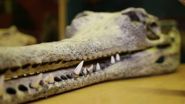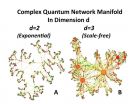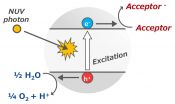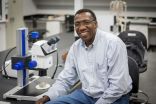Ultrafast uncoupled magnetism in atoms
A new step towards computers of the future
2015-09-10
(Press-News.org) Future computers will require a magnetic material which can be manipulated ultra-rapidly by breaking the strong magnetic coupling. A study has been published in Nature Communications today in which Swedish and German scientists demonstrate that even the strongest magnetic coupling may be broken within picoseconds (10-12 s). This will open up an exciting new area of research.
The element gadolinium is named after the Uppsala chemist Johan Gadolin who discovered the first rare-earth metal yttrium in the late 1700s. Gadolinium is in the same class of elements and it has unique magnetic properties which make it especially interesting for magnetic data storage. Its most useful property is that it has the greatest spin magnetic moment of any element since there are two different magnetic moments on every atom. These spin moments are coupled in parallel so strongly that no existing magnetic field on earth could break the coupling.
An international collaboration between Karel Carva and Peter Oppeneer, two physicists from Uppsala University, and researchers from the Free University Berlin and Konstanz University in Germany has shown that it is possible to break the coupling between the spin moments. Researchers in Berlin used light pulses shorter than picoseconds to excite metallic gadolinium and then monitored the spin dynamics of both spin moments with ultra-short, high-energy x-ray flashes. The spin dynamics they revealed showed that the strong coupling was broken within picoseconds (10-12 s) and it remained uncoupled for almost 100 picoseconds. The theoretical calculations of the Uppsala researchers provided a detailed explanation of how this fundamental magnetic interaction can be overcome.
"Not too long ago it became clear that the weaker coupling between spin moments on different atoms of a material can be broken. We've now shown that even the stronger spin magnetic coupling within an individual atom can be overpowered. This provides new opportunities to manipulate magnetic materials and opens new paths to the data storage of the future," says professor Peter Oppeneer.
INFORMATION:
Article reference:
Disparate ultrafast dynamics of itinerant and localized magnetic moments in gadolinium metal, B. Frietsch, J. Bowlan, R. Carley, M. Teichmann, S. Wienholdt, D. Hinzke, U. Nowak, K. Carva, P.M. Oppeneer & M. Weinelt,
http://dx.doi.org/10.1038/ncomms9262
ELSE PRESS RELEASES FROM THIS DATE:
2015-09-10
Dublin, Thursday September 10th, 2015 - Scientists from Trinity College Dublin have discovered that one gene mutation in a single species can trigger dramatic changes in whole biological communities; changes can be as great as those caused by the extinction of a top predator.
By using bacteria to replicate ecological systems in the lab, they found that mutations of a single gene that alter how one bacterial species interacts with others had huge structural impacts across their multi-species microbial communities. These 'social mutants' varied in their ability to produce ...
2015-09-10
Mathematicians investigating one of science's great questions -- how to unite the physics of the very big with that of the very small -- have discovered that when the understanding of complex networks such as the brain or the Internet is applied to geometry the results match up with quantum behavior.
The findings, published today (Thursday) in Scientific Reports, by researchers from Queen Mary University of London and Karlsruhe Institute of Technology, could explain one of the great problems in modern physics.
Currently ideas of gravity, developed by Einstein and Newton, ...
2015-09-10
This news release is available in Japanese.
The Earth's atmosphere contains oxygen because plants continuously produce it through photosynthesis. This abundant supply of oxygen allows life forms like animals to flourish. Therefore, oxygen had been thought to be an essential biomarker for life on extrasolar planets. But now, a research assistant professor Norio Narita of the Astrobiology Center of National Institutes of Natural Sciences (NINS), which was founded in April 2015, and an associate professor Shigeyuki Masaoka, of the Institute of Molecular Science of NINS, ...
2015-09-10
DENVER (Sept. 10, 2015) - An international team of scientists, including one from the University of Colorado Denver and another from the University of Colorado Anschutz Medical Campus in Aurora, announced the discovery Thursday of a new species of hominin, a small creature with a tiny brain that opens the door to a new way of thinking about our ancient ancestors.
The discovery of 15 individuals, consisting of 1,550 bones, represents the largest fossil hominin find on the African continent.
"We found adults and children in the cave who are members of genus Homo but ...
2015-09-10
A new study conducted in collaboration with Facebook using anonymised data from the social networking site shows a correlation between people's social and financial status, and the levels of internationalism in their friendship networks - with those from higher social classes around the world having fewer friends outside of their own country.
Despite the fact that, arguably, people from higher social classes should be better positioned to travel and meet people from different countries, researchers found that, when it comes to friendship networks, people from those ...
2015-09-10
ATLANTA -September 10, 2015- A new study finds breast cancer incidence and death rates are increasing in several low and middle income countries, even as death rates have declined in most high income countries, despite increasing or stable incidence rates. The findings come from a new report examining global patterns and trends in breast cancer using the most up-to-date cancer registry-based data available. It appears early online in Cancer Epidemiology Biomarkers and Prevention.
Breast cancer is the most commonly diagnosed cancer among all women worldwide overall and ...
2015-09-10
Mothers who quit smoking in pregnancy are more likely to light-up again after their baby is born if they feel stressed - according to a new report from the University of East Anglia.
Researchers studied interviews with more than 1,000 new mothers and found that the stress of caring for a newborn, sleepless nights, social pressure, and the idea that they no longer need to protect the baby - all contribute to relapse.
The study also found that women who felt they were being supported by a partner were less likely to start smoking again.
Lead researcher Dr Caitlin Notley, ...
2015-09-10
Major European study moves a step closer to treatments for severe asthma
Initial findings from a major European study have helped identify key characteristics of severe asthma, which will help with the development of new treatments for patients with the condition.
The new paper, published online today (10 September, 2015) in the European Respiratory Journal, is one of the largest assessments of adults with severe asthma to date, looking at several characteristics including symptoms, patients' quality of life and blood and airway measurements.
Over 30 million adults ...
2015-09-10
A new study in Diabetologia (the journal of the European Association for the Study of Diabetes) is the first to show that high intensity intermittent exercise training improves heart structure and benefits diabetes control in patients with type 2 diabetes. The study is led by Professor Michael Trenell and Dr Sophie Cassidy from Newcastle University (UK) and was funded by the National Institute for Health Research.
People with type 2 diabetes are twice as likely as those without diabetes to have heart disease, and heart disease is the leading cause of death and complications ...
2015-09-10
Most men in Europe want to spend fewer hours at work and more time with their families even though it would cut their income, a major study on employment shows.
The common belief that higher-earning men like to work longer to build their careers is shown to be wrong by the study - men who earn the majority of their household's income were most likely to want to work less.
Sociologists Dr Shireen Kanji and Dr Robin Samuel also found that for men breadwinners the attraction of spending more time with their partner is as strong a pull as children's company.
Dr Kanji, ...
LAST 30 PRESS RELEASES:
[Press-News.org] Ultrafast uncoupled magnetism in atoms
A new step towards computers of the future



